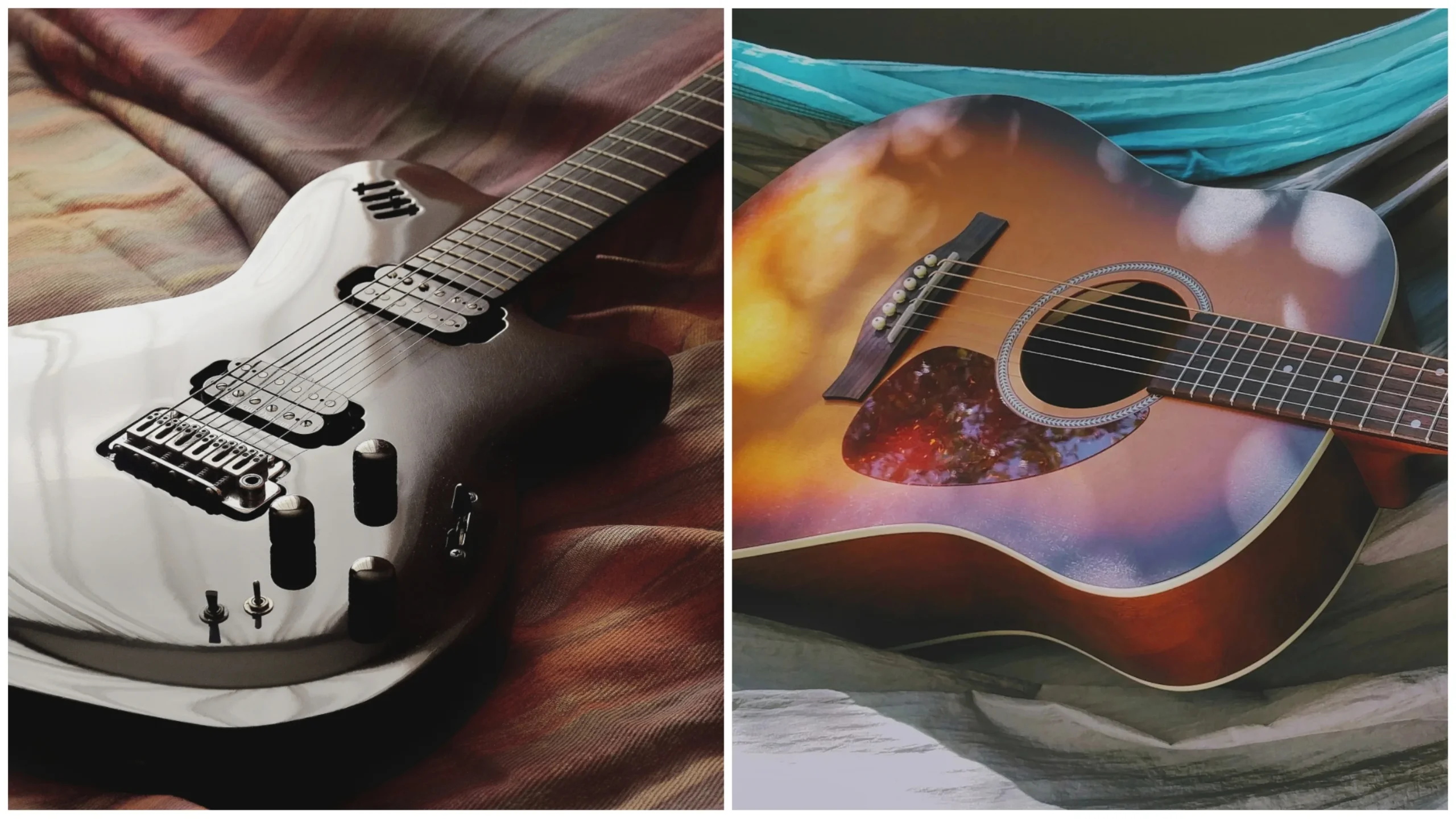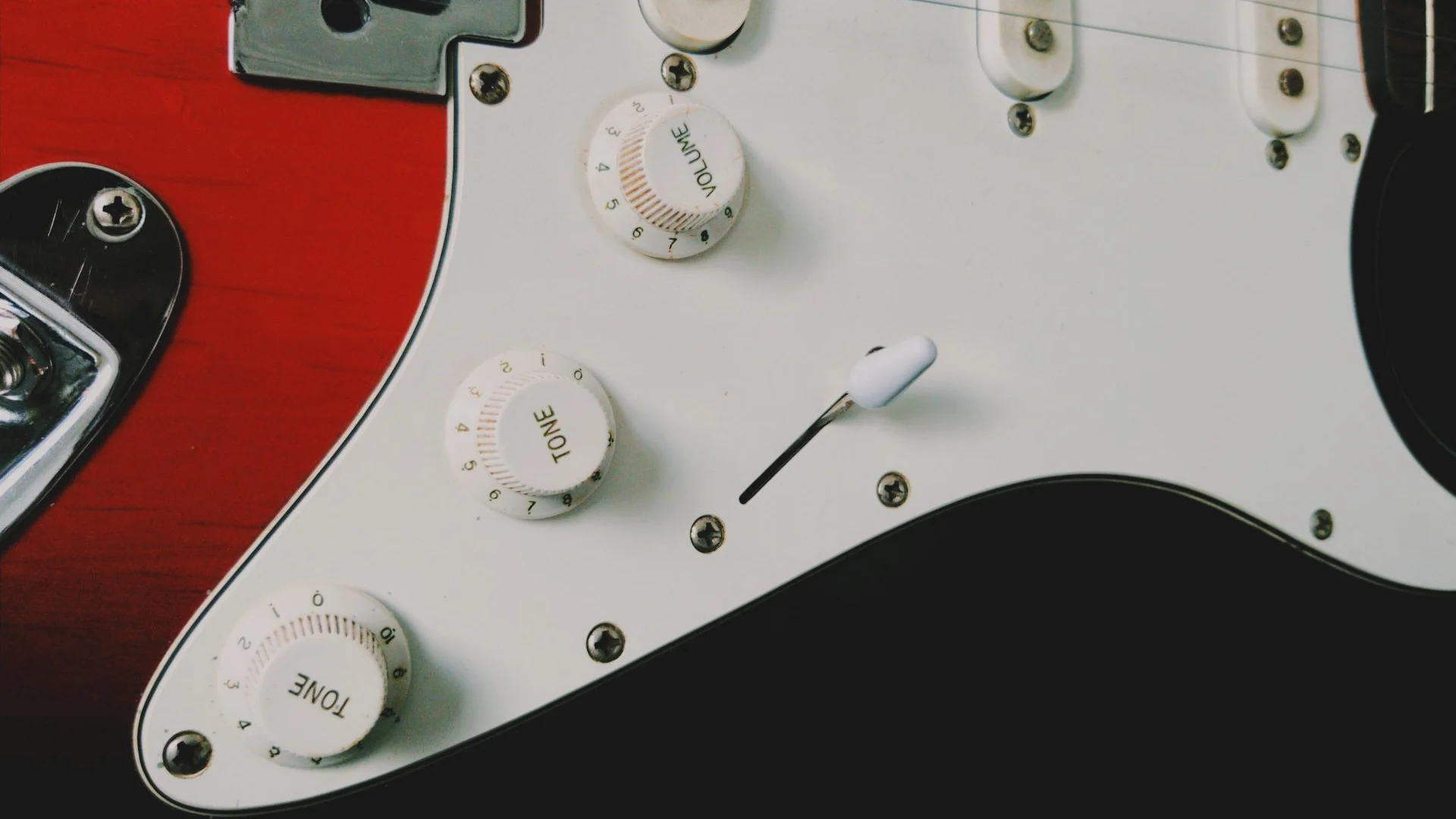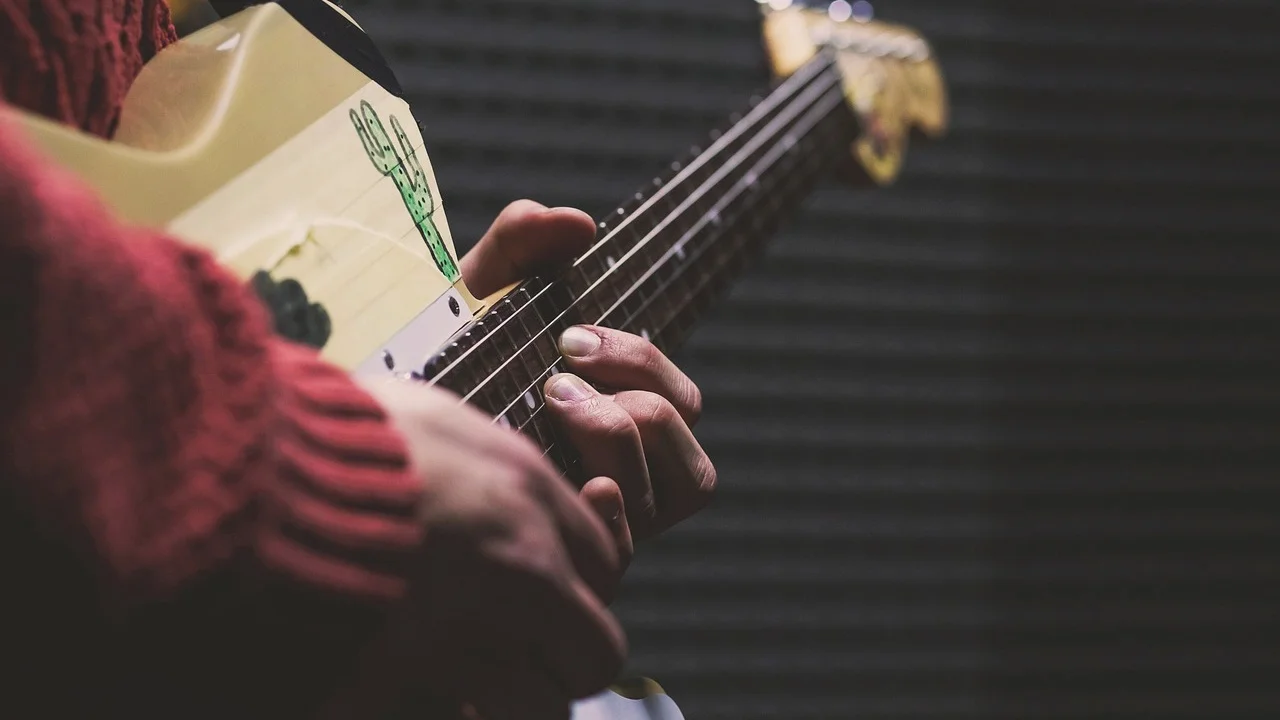
How To Learn Electric Guitar?
Learning to play the electric guitar is an exciting journey that opens up a world of musical possibilities.
Whether you’re a complete beginner or looking to enhance your existing skills, mastering this instrument can be incredibly rewarding.
Here, I’ll walk you through the essential steps to learn electric guitar effectively.
From Knowing the right instrument and equipment to understanding basic techniques and practicing efficiently, I’ve got you covered.
So, grab your guitar, plug in your amp, and let’s dive into the wonderful world of electric guitar playing!
Table of Contents
What Is The Necessary Equipment To Learn Electric Guitar?
To learn the electric guitar, there are several essential pieces of equipment that you will need to get started.
Guitar Amp
To play the guitar, you need a good amp. It’s not necessary to spend a lot of money on the best gear if you’re just getting started, but it should sound good.
Electric guitars require amplifiers. A good guitar amp is crucial to getting the best sound out of your electric guitar.
A good amplifier is the key to getting the most out of an electric guitar.
Instrument Cable
Your new amp will also require an instrument cable so that your brand-new electric guitar sounds its best. The amp is useless without it!
Guitar Tuner
When you first start playing guitar, you’ll need to learn how to tune your springs. A good tool can help you a lot with this.
Electric guitar tuners come in different types. Most often, Chromatic, Polyphonic, Strobe, and Microphone tuners are used.
If you use any of these tuners, you will achieve great sound and tuning.
Some tuners’ performance varies depending on whether they are used live or in groups.
Your local music store can help you determine which tuner is right for you.
Picks
Guitar picks are necessary when learning how to play the electric guitar.
Beginners should start with one between 0.6 and 0.73 inches thick, which comes in many sizes and shapes.
If you do this, you will be able to play and pick the guitar more effectively.
Over time, your picks will be lost and found in odd places. Extra picks are always a good idea if you play live.
Strap
A guitar strap helps you play your guitar more relaxed. It should be easy for you to find one that you like, as there are many colors and sizes available.
Straps can also be made from various materials. The most important things are comfort and usefulness.
A good guitar strap should fit comfortably around your shoulder and be strong enough to hold your guitar. Spend some money on a new strap if yours breaks on stage!
You can personalize this enamel pin with any music notes, words, or clipart images that are important to you so your guitar strap stands out and shows off your style.
Guitar straps aren’t the only thing you can create. With personalized stickers, you can make your whole guitar look cool.
Capo
Last but not least, you should purchase a guitar capo. Basically, this tool is a clamp that tightens strings. Changing the key allows you to play in a different key.
For beginners, it reduces the amount of complicated forms and stretching they have to do to play a song.
Additionally, many online lessons assume you have a capo handy. Make sure you get a good capo when you start playing the electric guitar.
How To Learn Electric Guitar: Step By Step Guide
Gather All The Equipment
Gather all the equipment before you begin. It is important to learn all of them.
Find Your Perfect Starter Electric Guitar
In addition to the other things we’ve already discussed, you’ll also need to choose the best electric guitar for beginners.
Electric guitars of all types and sizes are a great place to start.
You need to know what kind of guitar you need.
Is a full-size electric guitar necessary to get started? Is there an electronic guitar that isn’t too heavy? Think about these questions before you buy your first electric guitar.
Know Your Budget
The kind of guitar you want to start with will depend on your budget. Electric guitars for newbies should be inexpensive, but some good products cost a lot.
If you are serious about learning to play the electric guitar, it will cost you at least $200 to $300.
However, you will be able to practice and play often, even though this is not an expensive instrument.
Professional and high-end guitars are undoubtedly more expensive than beginner guitars, but that does not mean they are inferior instruments.
It is important to get a good quality guitar for your first guitar.
Electric guitars that are easy to practice are the best for beginners.
It is important to remember the greatness of your first guitar, no matter how many others you have.
Do Your Research
Find out what features the best electric guitars for beginners have before you purchase anything.
If you want to learn how to play guitar, you could spend all day playing electric guitars.
It is important to consider the different body types for electric guitars. There are a few different styles of solid-body guitars to choose from:
- V-shape
A V-shape solid-body guitar is an easy-to-understand type. Its body is shaped like a V.
- Single-Cutaway
Guitars with Single Cutaway bodies are easier to play high notes on because they only have one curve. The fingerboard’s body curve is called a “cutaway.”
- Double-Cutaway
The Double-Cutaway guitar is exactly what it sounds like a guitar with two curves near the neck.
If you want something different from solid-body electric guitars, you can also choose hollow or semi-hollow-body electric guitars.
Electric guitars with hollow bodies are similar to acoustic guitars.
Semi-hollow guitars also have a solid center block, which reduces noise.
The hollow or almost hollow guitar is often used in jazz, blues, rock, and country music.
If you’re looking for a guitar that can play jazz, rock, and dance, a Fender Telecaster starter pack might be right for you.
One day, you’ll switch to a Fender Jaguar or an Ibanez Stratocaster.
Consider your pickups and bridges when choosing the best body. A double-cutaway body is the best electric guitar for playing and practicing.
The music store near you can help you buy a beginner guitar. If you want a second opinion, check out some online forums and other guitar shops.
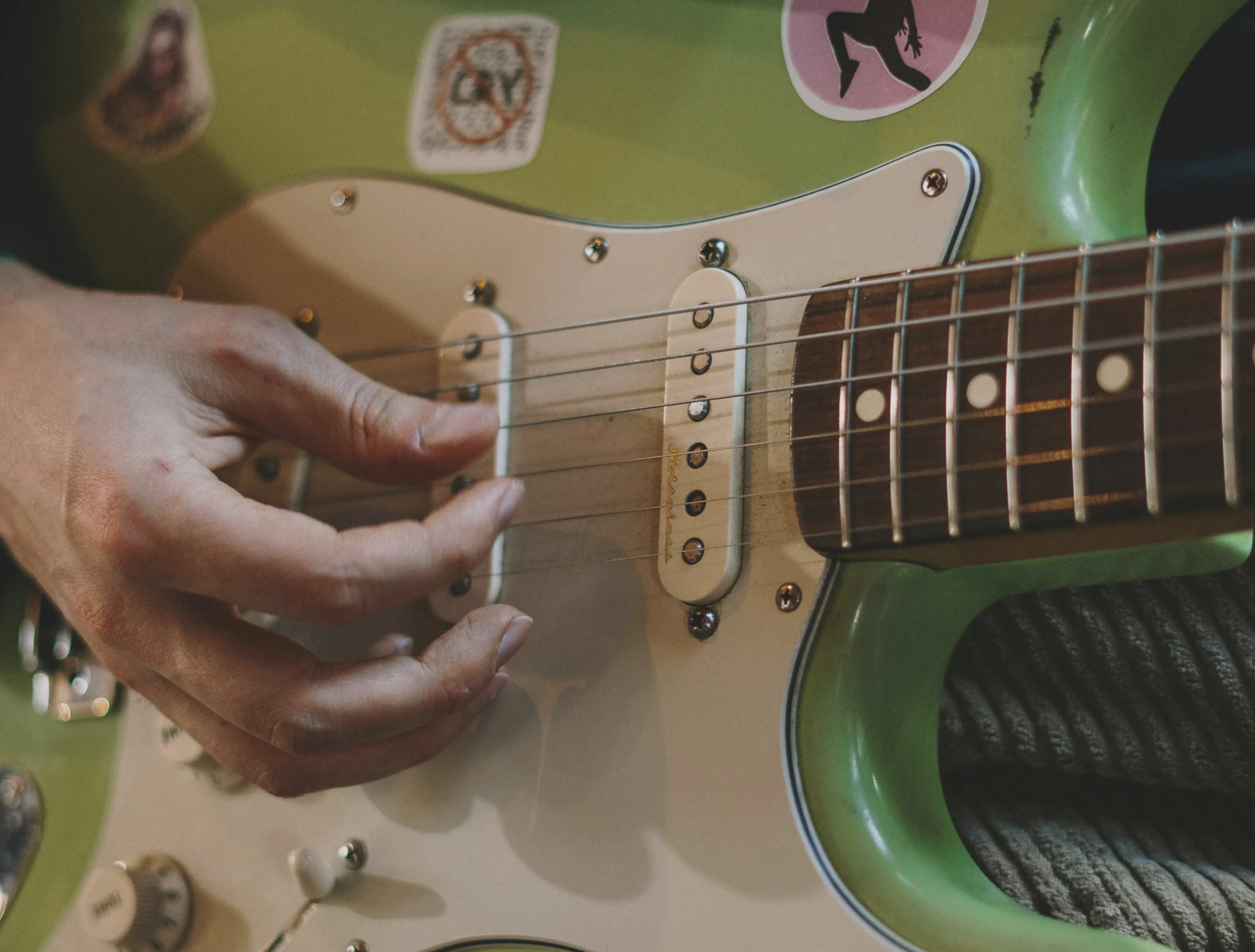
Learn Basic Chords And Scales
If you want to play electric guitar, you should learn the chords and practice making scales. This will make keeping track of your favorite songs easier and more fun.
Some notes, such as B and F, will be harder to learn at first. However, you can learn easier versions of any difficult chords.
This will make it much easier to learn how to play the electric guitar.
With practice, you will become more agile and have better muscle memory. It will initially feel normal to go through scales and chord progressions.
After you have mastered most of the basics, find some really easy songs to learn.
If you choose the best electric guitars for beginner songs, you will be encouraged to work on your skills more.
Knowing chords and scales will also make it easier for you to play with other artists.
Playing music and making up songs together will be easier since you know things about each other. Many people learn to play the guitar to improve their skills.
Learn To Use An Amp
Playing an electric guitar will require you to understand how your amp works. Basically, the amp boosts the noise from your guitar.
If you are familiar with your amplifier, you will have an easier time playing your first electric guitar.
Most amplifiers have more than one channel, which can greatly affect their sound. The simplest amps will have features that let you change and boost your sound.
First-time guitarists should look for amps that sound great and are easy to use.
The amp’s speaker and your guitar’s tone will all produce a “clean” channel.
The second channel of most amps lets you get a “dirtier” sound, which is often referred to as overload or distortion.
If your amp has more than one gain channel, you can use your foot pedal to switch between different sounds.
Are you playing your first electric guitar? It might be best to use a normal, clean tone. EQing your amp will help us accomplish this.
All three of your EQ settings should be set to 5. There are three types of frequencies: bass, midrange, and treble.
Numbers should range from 0 to 10. If the amp includes effects like chorus, delay, etc., turn them off.
Next, select the clean channel and turn up the guitar knob to 10. By moving the knob to the middle, you can change the tone.
When you set up your guitar and amp this way, you’ll get a tone that you can count on every time you play.
Having a good guitar amp for beginners shouldn’t be a problem, but your electric guitar sound will be terrible if you play it through a bad amp.
Learning more about amps will allow you to experiment with how they can alter your guitar’s volume and tone.
You’ll enjoy messing around with your amp as you learn to play the electric guitar.
Listen To Your Favorite Electric Guitarists
The best way to discover your style is to listen to the music of your favorite musicians.
Knowing what kind of music you like will help you choose how to play. Even if it’s hard to sound like Jimi Hendrix or Jonny Greenwood, getting ideas is always helpful.
A newbie may find it difficult to use an electric guitar. There are a lot of buttons and effects to play with.
You might not pay attention to the important things. When you’re playing alone and frustrated, it’s hard to get motivated.
A pro will demonstrate the importance of practice to you. A good electric musician doesn’t need lots of pedals, and an amp will sound bad no matter how much you spend.
If your amp is too loud, you may feel weak, and you can pick up on every flaw.
Instead of just making it louder, look at how the players you like use their amps to improve their sound. Pay attention to the rhythm they play and the tone and sound they can produce.
Electric guitars can be challenging for some very good acoustic players. Use every tool at your disposal to help the song or piece of music.
Listening to a variety of musicians’ music will allow you to understand how they use their amps and pedals.
Sometimes, you want to rock out, and other times, an electric guitar is only for music.
Electric guitars can also do a variety of things. A beginner’s guide for electric guitar should emphasize the importance of training your ears.
There are times when an electric guitar solo is great, and there are times when it just doesn’t belong.
You will become more aware of this as you listen to more songs with electric guitars.
Practice As Much As Possible
It takes practice to become perfect! The best way to learn to play electric guitar is to practice as much as you can.
You will become a better guitarist if you continuously take out your guitar each day, whether it is for 20 minutes or two hours.
Then, it’s time to get started. Once you’ve got all the equipment and accessories assembled, you can begin playing.
Practice is the key to success. It includes finding a good teacher, using online resources, and listening to a lot of electric guitar music.
It’s all about developing good habits. Picking up your electric guitar should make you feel confident that you can make some great music.
Setting goals for each practice session and caring for your instrument are important parts of this.
You may not feel inspired every session, but there are a number of resources available to help you.
There are many sources of inspiration available. Listening to great artists like Hendrix and Clapton will get you excited instead of disheartened if you truly want to excel.
It is comforting to know that outstanding guitarists gained their success through daily practice and a curious mind.
Play with Other Musicians
Be confident! Perform with other musicians as soon as possible. Learning from your peers is one of the best ways to develop.
Practicing the electric guitar on your own can take hours without making any progress.
When playing with other instruments, the electric guitar performs best in genres like rock, blues, and jazz.
Consider finding another guitarist, pianist, drummer, or singer. They will broaden your musical horizons.
Try Learning Some Music Theory
Having a solid understanding of music theory will make your life easier in the long run.
Even if you have an extensive knowledge of music theory, you won’t necessarily become an outstanding guitarist.
Beginners should practice and take all the other measures we’ve discussed.
As you improve as a guitarist, you’ll need to understand some music theory to learn new songs and play with others.
You will be able to understand how notes, chords, timing, and keys relate to one another by learning music theory.
The ability to solo, play rhythm guitar, and even compose is essential for becoming an electric guitarist.
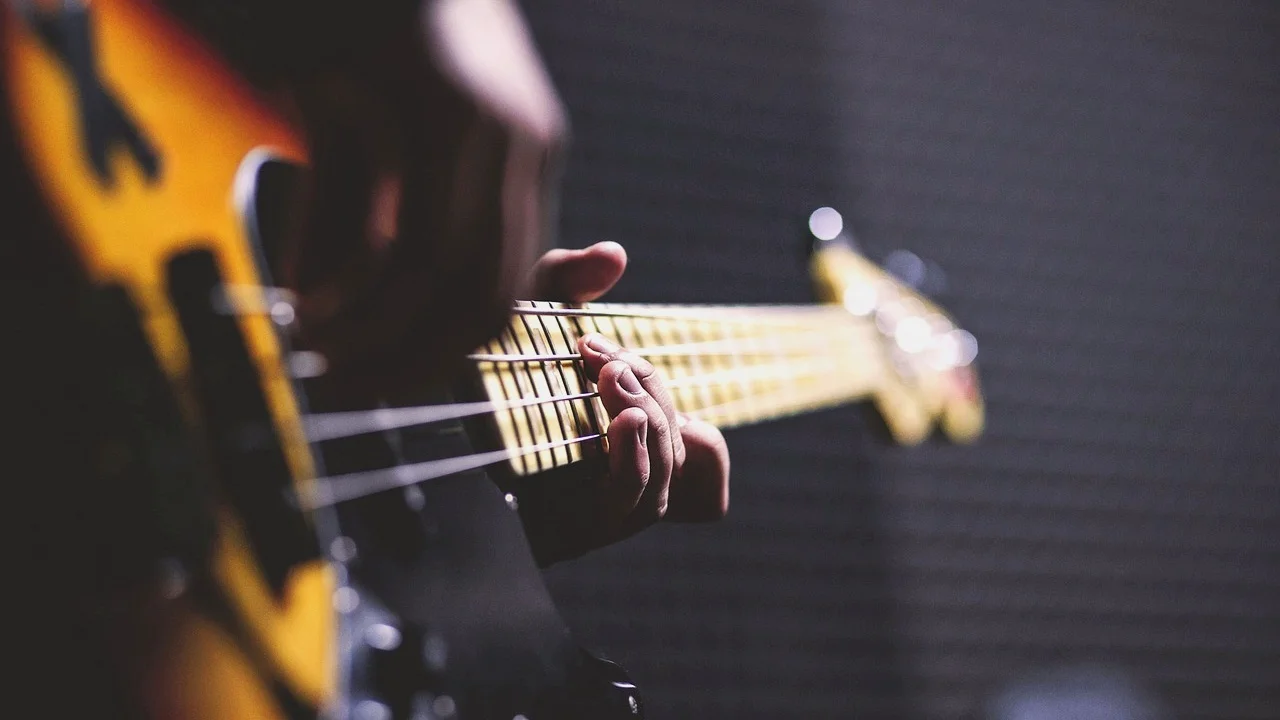
Should I Learn Electric Guitar As A Beginner?
Yes. Beginners can learn electric guitar. However, learning how to play the electric guitar can be challenging.
Learning this new skill will be a lot easier if you follow these steps. To learn electric guitar, follow the following guidelines.
Find The Right Electric Guitar For You
There are different types of electric guitars, and some are better for beginners than others. Try out a few different guitars before you buy one.
When you buy a guitar, you’ll know exactly what you’re buying. Having the right tools makes learning electric guitar easier.
Choose The Proper Training For Yourself
A new instrument can be learned by experimenting with it for some people. On the other hand, some people require structured training.
You should take lessons if you want to know “how to play the electric guitar?” and if you feel lost.
How Can I Learn To Play The Electric Guitar?
There are a variety of ways to get started playing the guitar, just like with any other instrument. Here is how I learned electric guitar on my own
Start A Private Guitar Lessons
Start a personal private guitar class with a teacher who comes to my home to teach you how to play the guitar.
Organized Classes
Join an organized class in my town.
You can also find organized courses across the country by typing “guitar lessons London,” “guitar classes Portland,” or “guitar lessons Boston” into your web browser.
You can find these classes at your local recreation center or music school.
Online Guitar Classes
Also, sign up for virtual guitar classes. Taking music classes is possible through a “virtual school.”
Also, you can watch YouTube videos or tutorials. It is worth paying for a good one. The quality is sometimes poor, but sometimes you can find free ones.
Guitar Classes From A Book
Get help from music stores and practice using various guides, such as music sheets, music tabs, and different methods of playing.
How Long Does It Take To Learn An Electric Guitar?
You need to consider more than just your skill level. In the long run, the guitarist who works hard and does it the right way will beat the less dedicated but more “talented” artist. Why?
The process of learning how to play the guitar with your hands and fingers will be similar to learning how to walk.
You’ll have to build up hand muscles that you didn’t know you had, as well as learn how to move your fingers very precisely and in sync.
The only way to learn these moves, make your hand muscles remember them, and become better at playing the guitar is to practice every day.
You can reach these steps in the time given by practicing regularly (1+ hours per day) and the right way:
Playing Level | Time needed | Skills |
Newbie | 1-2 months | Strumming and changing chords on the guitar, single-string plucking songs without jumping too much, chord arpeggios) |
Beginner | 3-6 months | Consider playing songs with more technical elements, which are a bit more challenging. Songs that require hammer-ons, pull-offs, and other easier lead guitar techniques. |
Almost intermediate | 1 year | A wide variety of popular guitar songs, riffs, blues, and so on can be played at an intermediate level. This is also the time when barre chords will probably begin to feel more natural to you. |
Intermediate | 2 years | After two years of practice, you should be able to play most songs. Practicing these songs will be necessary before you are actually able to play them, but you’ll have mastered most technical elements at this point. |
Intermediate plus | 2-3 years | The more you learn about guitar theory, the more likely you are to be able to improvise on the guitar. |
Advanced | 5-6 years | A guitarist who is advanced will be able to play anything they desire. |
Rockstar | 10 years | The more you learn, the more you realize how much you don’t know. An average of 7-12 guitars will be added to your collection each year. |
Guitar deity | 20+ years | There will be no shortage of entertainment for others as you play and entertain them continuously. There are 20 guitars in your collection, but only 3 are the ones you play the most. |
Final Words On How To Learn Electric Guitar
Learning to play the electric guitar is not just a hobby; it’s a journey of self-expression and creativity.
As you navigate through chords, scales, and melodies, you’re unlocking a world of musical possibilities that can bring immense joy and fulfillment.
Embrace the process, enjoy the sound of your strings vibrating with each strum, and let the music guide you.
Whether you’re a beginner or an experienced player, remember that every note played is a step closer to mastering this versatile instrument.
Keep practicing, keep playing, and let the power of music fuel your passion for the electric guitar.

